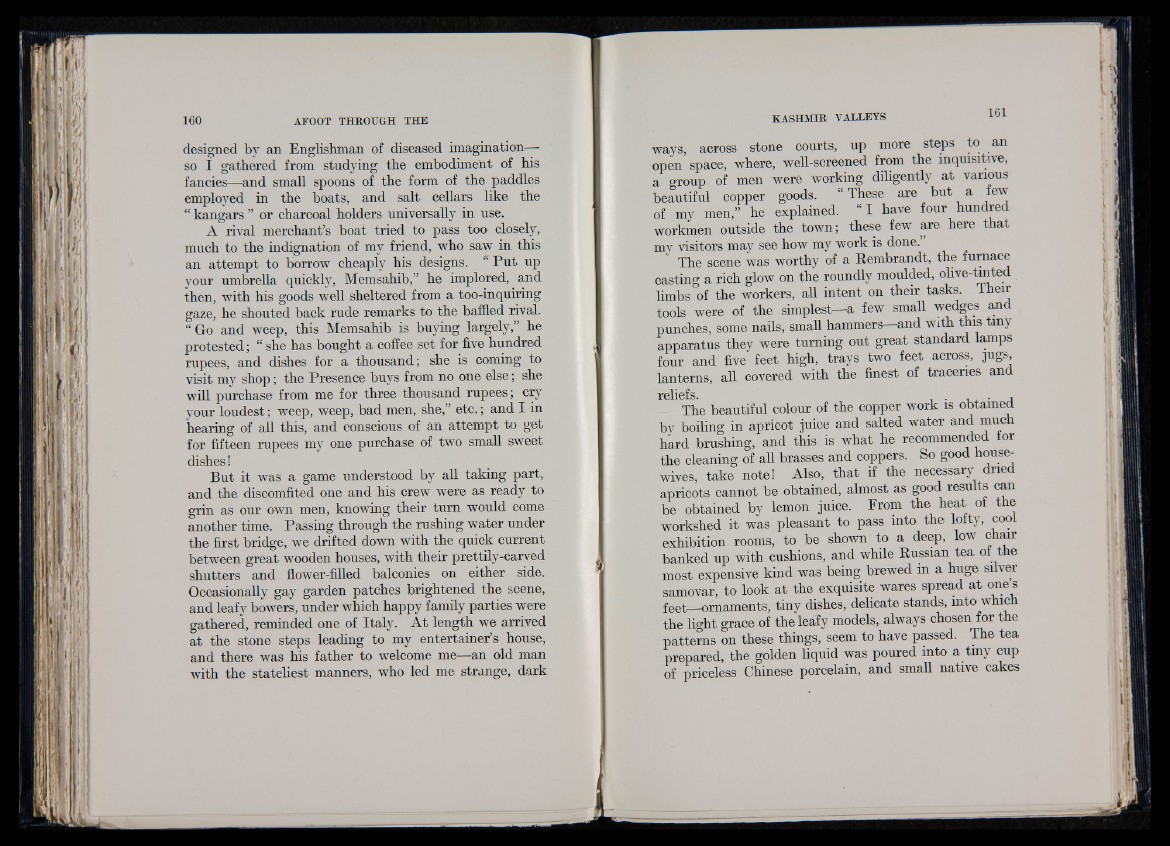
designed by an Englishman of diseased imagination—
so I gathered from studying the embodiment of his
fancies—and small spoons of the form of the paddles
employed in the boats, and salt cellars like the
“ kangars ” or charcoal holders universally in use.
A rival merchant’s boat tried to pass too' closely,
much to the indignation of my friend, who saw in this
an attempt to borrow cheaply his designs. “ P u t up
your umbrella quickly, Memsahib,” he implored, and
then, with his goods well sheltered from a too-inquiring
gaze, he shouted back rude remarks to the baffled rival.
“ Go and weep, this Memsahib is buying largely,” he
protested; “ she has bought a coffee set for five hundred
rupees, and dishes for a thousand; she is coming to
visit my shop; the Presence buys from no one else; she
will purchase from me for three thousand rupees; cry
your loudest; weep, weep, bad men, she,” etc.; and I in
hearing of all this, and conscious of an attempt to get
for fifteen rupees my one purchase of two small sweet
dishes!
But it was a game understood by all taking part,
and the discomfited one and his crew were as ready to
grin as our own men, knowing their turn would come
another time. Passing through the rushing water under
the first bridge, we drifted down with the quick current
between great wooden houses, with their prettily-carved
shutters and flower-filled balconies on either side.
Occasionally gay garden patches brightened the scene,
and leafy bowers, under which happy family parties were
gathered, reminded one of Italy. At length we arrived
at the stone steps leading to my entertainer’s house,
and there was his father to welcome me—an old man
with the stateliest manners; who led me strange, dark
ways, across stone courts, up more steps to an
open space, where, well-screened from the inquisitive,
a group of men were working diligently at various
beautiful copper goods. “ These are but a few
of my men,” he explained. “ I have four hundred
workmen outside the town; these few are here that
my visitors may see how my work is done.
The scene was worthy of a Rembrandt, the furnace
casting a rich glow on the roundly moulded, olive-tinted
limbs of the workers, all intent on their tasks. Their
tools were of the simplest—a few small wedges and
punches, some nails, small hammers—and with this tiny
apparatus they were turning out great standard lamps
four and five feet high, trays two feet across, jugs,
lanterns, all covered with the finest of traceries and
reliefs.
The beautiful colour of the copper work is obtained
by boiling in apricot juice and salted water and much
hard brushing, and this is what he recommended for
the cleaning of all brasses and coppers. So good housewives,
take note! Also, that if the necessary dried
apricots cannot be obtained, almost as good results can
be obtained by lemon juice. From the heat of the
workshed it was pleasant to pass into the lofty, cool
exhibition rooms, to be shown to a deep, low chair
banked up with cushions, and while Russian tea of the
most expensive kind was being brewed in a huge silver
samovar, to look at the exquisite wares spread a t one s
feet—ornaments, tiny dishes, delicate stands, into which
the light grace of the leafy models, always chosen for the
patterns on these things, seem to have passed. The tea
prepared, the golden liquid was poured into a tiny cup
of priceless Chinese porcelain, and small native cakes